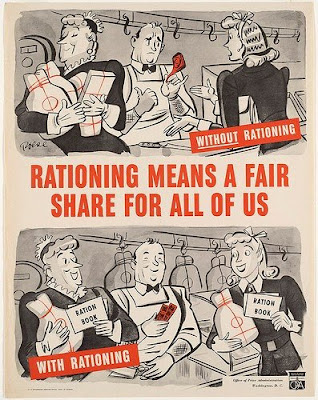
I'm not afraid of rationing.
Over at The Covert Rationing Blog, the eccentric DrRich, who likes to refer to himself in the third person, takes a backwards look at the failed health-reform efforts of the Clinton administration, explains why things are different today, and gleefully contemplates the idea that the Obama team may find themselves confronting the R word.
So?
I'm not old enough to have lived through rationing in this country, but I've done a lot of reading, and I don't exactly understand why rationing is such a dirty word, even when applied to health care. It's not something for those of us who aren't insured now to worry about, because any health-care system that formalized rationing would give us more than we're getting now. Some 22,000 of us die each year for no good reason.
If rationing means that more of the terminally ill die with dignity, instead of being subjected to futile extreme measures so their families can quell their consciences, I have no qualms. If it means that, instead of getting elective surgery on demand, some people have to wait a little while, I'm unsympathetic. The poor and the uninsured are waiting much longer now.
As for those who can now buy whatever kind of health care they desire, well, surely no one is naive enough to believe that reforms will stop the rich from getting what they want. Where there is rationing, there are black markets.
No matter what happens in health reform, I assume there will continue to be exclusive private clinics where the wealthy can have their tummies tucked and their boobs lifted, and no doubt some of them will branch out to other services if there's money in it. Medical tourism will continue to boom, too. The rich will always get all the medical treatment they demand, just as they do even in countries with full-blown socialized medicine (a system that no one here is seriously advocating).
And what of the middle-class — that portion of them, anyway, who've managed to hang on to their jobs and benefits? How will reform — with, perhaps, the dreaded rationing — affect them?
Well, right now millions of supposedly well-insured American workers are spending 10 to 25 percent of their income on medical bills, and they're going bankrupt or losing their homes when they get sick.
How could overt health-care rationing possibly be worse?




No comments:
Post a Comment
If you have trouble posting a comment, your browser privacy settings may be interfering. Change your settings to allow third-party cookies (session cookies will do) or add an exception for blogger.com. I apologize, but this is a Blogger issue over which I have no control.